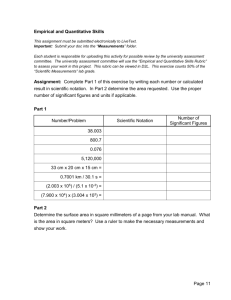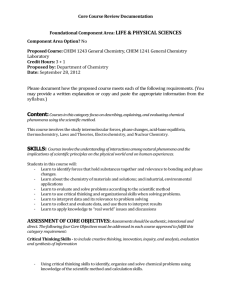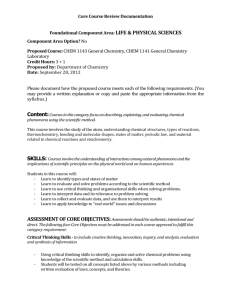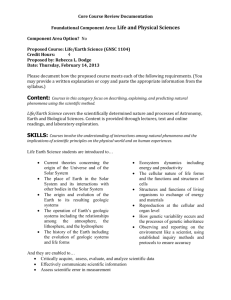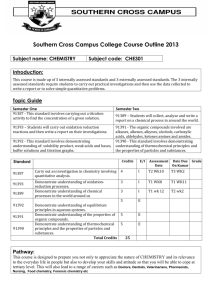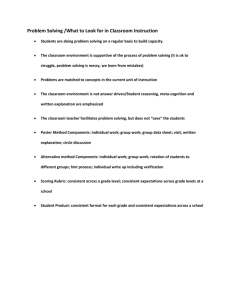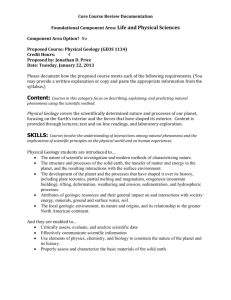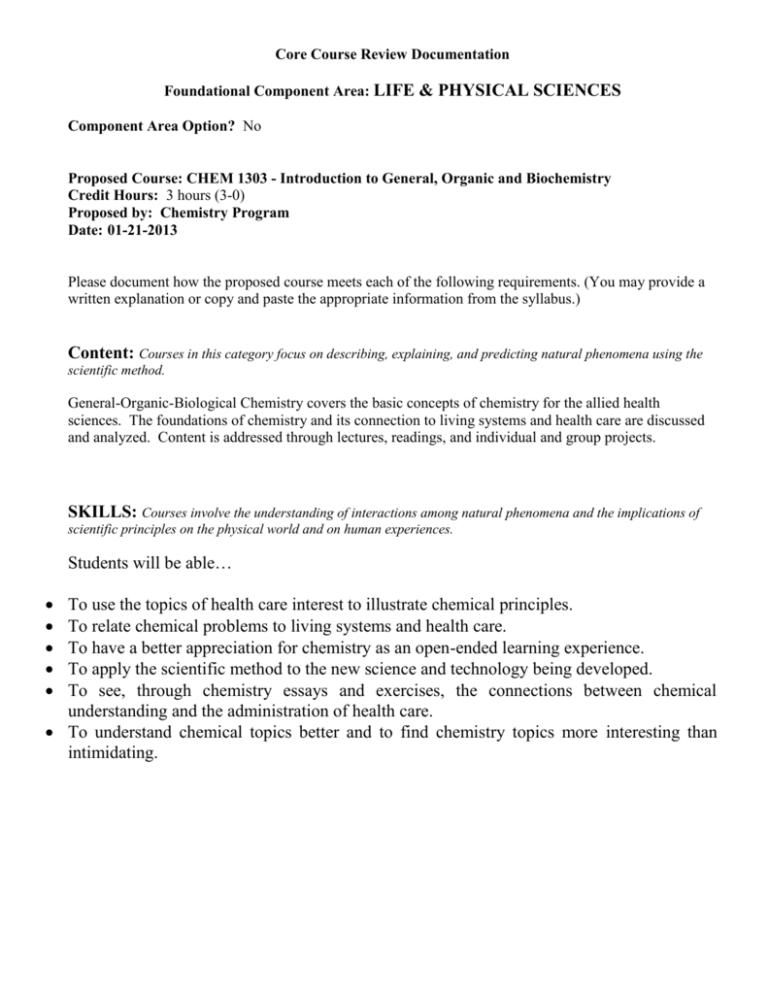
Core Course Review Documentation
Foundational Component Area: LIFE & PHYSICAL SCIENCES
Component Area Option? No
Proposed Course: CHEM 1303 - Introduction to General, Organic and Biochemistry
Credit Hours: 3 hours (3-0)
Proposed by: Chemistry Program
Date: 01-21-2013
Please document how the proposed course meets each of the following requirements. (You may provide a
written explanation or copy and paste the appropriate information from the syllabus.)
Content: Courses in this category focus on describing, explaining, and predicting natural phenomena using the
scientific method.
General-Organic-Biological Chemistry covers the basic concepts of chemistry for the allied health
sciences. The foundations of chemistry and its connection to living systems and health care are discussed
and analyzed. Content is addressed through lectures, readings, and individual and group projects.
SKILLS: Courses involve the understanding of interactions among natural phenomena and the implications of
scientific principles on the physical world and on human experiences.
Students will be able…
To use the topics of health care interest to illustrate chemical principles.
To relate chemical problems to living systems and health care.
To have a better appreciation for chemistry as an open-ended learning experience.
To apply the scientific method to the new science and technology being developed.
To see, through chemistry essays and exercises, the connections between chemical
understanding and the administration of health care.
To understand chemical topics better and to find chemistry topics more interesting than
intimidating.
ASSESSMENT OF CORE OBJECTIVES: Assessments should be authentic, intentional and direct.
The following four Core Objectives must be addressed in each course approved to fulfill this category requirement:
Critical Thinking Skills - to include creative thinking, innovation, inquiry, and analysis, evaluation and synthesis of
information
Critical thinking skills are developed through course readings, lectures, individual and group projects. As
an example of critical thinking skills development, the specific assessment for critical thinking in this
course is obtained through a Journal Project, in which each student selects appropriate articles pertaining to
chemistry in the health sciences. Students will base their analysis upon a minimum of ten articles. The
Journal Project (see attachment) will be assessed using an attached rubric that is based on the AACU
Critical Thinking Value Rubric. Students will be expected to exceed the benchmark (level 0) of the rubric.
In all of the rubrics, the point system is an “in-house” means of giving credit that may enhance the
student’s grade in the course.
Communication Skills - to include effective development, interpretation and expression of ideas through written,
oral, and visual communication
Written communication skills will be assessed using the Journal Project mentioned under the Critical
Thinking Core Objective. Ten or more articles will analyzed and then students will write a detailed
statement on how these issues have increased your awareness of topics in health care chemistry. The
Journal Project (see attachment) will be assessed using an attached rubric that is based on the AACU
Written Communication Value Rubric and students will be expected to exceed the benchmark (level 0) of
the rubric.
Oral communication skills will also be assessed through preparation and presentation of posters. The topics
will involve group research into a theme chosen by each student group in which chemical issues are
developed concerning a health related topic. During the poster presentation, students will express their
ideas orally, in writing, and visually. The Chemistry Poster Presentation Project (see attachment) will be
assessed using an attached rubric that is based on the AACU Oral Communication Value Rubric and
students will be expected to exceed the benchmark (level 0) of the rubric.
Empirical and Quantitative Skills - to include the manipulation and analysis of numerical data or observable facts
resulting in informed conclusions
The empirical and quantitative skills are a pillar of any physical science and are carried throughout the
course and assessed continually as the course develops. Empirical skills and quantitative skills are
developed throughout the course through test questions, homework, and assigned readings. The specific
assignment used to assess Empirical and Quantitative Skills in this course are problems embedded in a
homework assignment and the first major exam as noted on the “Proposed Lecture Schedule” of the
“General-Organic-Biological Chemistry Syllabus”. The basic development of properties and characteristics
of matter, manipulation and analysis of quantitative data of gas properties, serves as an example for the
assessment of empirical and quantitative skills, and a sample of embedded questions used in this
assessment is presented as a homework assignment in which two thirds of the assessment is quantitative
and one third is empirical (see attached Empirical and Quantitative Homework Assessment). The
Homework Questions (see attachment) will be assessed using an attached rubric that is based on the AACU
Quantitative Literacy Value Rubric. Students will be expected to exceed the benchmark (level 0) of the
rubric.
Teamwork - to include the ability to consider different points of view and to work effectively with others to support
a shared purpose or goal
Teamwork skills will be assessed through the Chemistry Poster Presentation Project mentioned under the
Communication Core Objective. Since CHEM 1303 is lecture only with no laboratory section, students
will be arranged in groups to complete this out of class assignment. Therefore, it is important to have a
“self-assessment” component of teamwork, as the instructor will not be present through much of the
teamwork development. Students will each evaluate their perceived percentage contribution to the poster
presentation. The instructor will also evaluate each student’s contribution to the poster presentation. The
Chemistry Poster Presentation Project (see attachment) will be assessed using an attached rubric that is
based on the AACU Teamwork Value Rubric. Students will be expected to exceed the benchmark (level 0)
of the rubric.
ADDITIONAL INFORMATION: Provide any additional information supporting course inclusion
in the core (optional).
PLEASE ATTACH THE FOLLOWING
1.
2.
3.
4.
5.
Syllabus
Assessment for Critical Thinking Skills
Assessment for Communication Skills
Assessment for Empirical & Quantitative Skills
Assessment for Teamwork
JOURNAL PROJECT
1.
2.
3.
4.
5.
6.
Your assignment to write a journal entry analyzing and answering the following questions:
What is the event, issue or concern?
Is it a treatment, condition, treatment, diagnostic test, or a combination?
Describe the impact on health care.
Is the science (or chemical process) presented?
References
After 10 or more articles have been analyzed write a statement on how these issues have increased your
awareness of topics in health care chemistry.
ASSESSMENT
Project will be assessed on two separate skills
1. Critical Thinking – 6 possible points
2. Written Communication – 4 possible points
CRITICAL THINKING RUBRIC – 6 POINTS POSSIBLE
POINTS
ISSUES
2
Issue/event/problem
stated with clarification
or description
1
Issue/event/problem
stated without
clarification or
description
EVIDENCE
Information is taken from Information is taken
source(s) with enough
from source(s) with
interpretation/evaluative some interpretation/
to develop an analysis or evaluation
synthesis; viewpoints are
questioned
CONCLUSIONS/ Conclusions logically tied Conclusions/outOUTCOMES
to a range of information; comes tied to
outcomes identified
information (chosen
clearly
to fit); some
outcomes are
identified
0
Issue/event/problem not
stated
TOTAL
Information listed
without interpretation or
evaluation
Conclusions/outcomes
not tied to information;
outcomes are
oversimplified
SCORE
WRITTEN COMMUNICATION RUBRIC – 4 POINTS POSSIBLE
POINTS
CONTEXT
AND PURPOSE
DISCIPLINARY
CONVENTIONS
2
Demonstrates
thorough attention to
context, purpose,
and assigned task
Uses all required
organizational and
presentation
elements
1
Demonstrates adequate
attention to context,
purpose, and assigned
task
Minimally uses required
organizational and
presentation elements
0
Demonstrates minimal
attention to context,
purpose, and assigned
task
Fails to use required
organizational and
presentation elements
SCORE
TOTAL
CHEMISTRY POSTER PRESENTATION PROJECT
1.
2.
3.
4.
5.
Your assignment
Select a health care topic in Chemistry of interest to your group.
Identify the chemically related issue that created the negative or positive impact on health care.
Do literature research online and/or in the library to develop your topic.
Identify and promote alternative responses that would reduce negative effects or increase positive effects
References
ASSESSMENT
Project will be assessed on two separate skills
1. Communication – 6 points
2. Teamwork (self-assessment) – 3 points
ORAL COMMUNICATION RUBRIC – 6 POINTS POSSIBLE
POINTS
2
ORGANIZATION All required elements are
addressed
SUPPORTING
Examples/statistics/
MATERIALS
explanations make
references that significantly
support credibility of
presentation
1
3-4 required elements are
addressed
Examples/statistics/
explanations make
references that partially
support credibility of
presentation
CENTRAL
MESSAGE
Not memorable
Compelling
0
Fewer than 2 required
elements are addressed
Examples/statistics/
explanations make
references that
minimally support
credibility of
presentation
Not explicitly stated
TOTAL
SCORE
TEAMWORK RUBRIC - 3 POINTS POSSIBLE
POINTS
CONTRIBUTES TO
TEAM MEETINGS
(student evals)
INDIVIDUAL
CONTRIBUTIONS
OUTSIDE OF TEAM
MEETINGS (Teacher
Evals)
2
Offers alterative solutions
or course of action that
build on the ideas of others
Proactively helps other
team members complete
their assigned tasks to a
similar level of excellence.
1
Offers new suggestions
to advance work of the
group
Completes assigned
tasks by deadline; work
advances project
0
Listens to ideas but
does not advance
work of the group
Fails to complete
assigned tasks
SCORE
TOTAL
Empirical and Quantitative Homework Assessment:
1.
2.
3.
4.
5.
6.
ASSESSMENT
Project will be assessed on Empirical and Quantitative skills
QUANTITATIVE LITERACY RUBRIC - 3 POINTS POSSIBLE
POINTS
CALCULATION
APPLICATION/
ANALYSIS
2
Calculations attempted are
successful and elegantly
presented
Deep and thoughtful
judgments; insightful
conclusions
1
Only a portion of the
attempted calculation
solve the problem
Ordinary, “workmanlike”
judgments; plausible
conclusions
0
Calculations are
unsuccessful and not
comprehensive
Tentative judgments;
uncertain conclusions
SCORE
TOTAL
GENERAL-ORGANIC-BIOLOGICAL CHEMISTRY
CHEM 1303-201
Instructor: Dr. R. L. Cate
Phone, Office, Email: (940)397-4284; BO 307; rodney.cate@mwsu.edu
Office Hours: by appointment {call 397-4251}
Text: (Required): General, Organic & Biological Chemistry: An Integrated Approach, Laura Frost,
Todd Deal, & Karen C. Timberlake, 2011, Pearson Prentice Hall, N.J.
SaplingLearning Online Homework Access Kit {Online Homework License}
(Recommended): Study Guide and Guided Inquiry Activities
Prerequisites: Math 1003, math THEA score of 270, math Accuplacer score of 90, or satisfactory score
on placement exam.
Grading Procedure:
Quizzes & Online Homework
Exams I-III
Group Activity
Individual Project
Final Exam
55%
10%
10%
15%
10%
Quizzes – to be given periodically covering assigned material and previous class lectures (may or may not be
announced).1
Homework – To be posted on the “SaplingLearning” class site. Late homework will not be accepted.1
Major Exams – see "Proposed Schedule" on class website (available when announced in class).
Group Activity – One group activity that will be completed and presented in poster format. (10% of class grade)
If you miss the day that your group does one of these, you will do one on your own and present it during my
office hours.
Individual Project –An individual project will comprise the keeping of a journal of newspaper or journal articles
about the chemistry in the health sciences with comments and self assessment of your new perspectives (weekly
journal with 10 entries required). (10% of class grade)
Final Exam – see "Proposed Schedule" on class website.
Attendance Policy: Attendance is mandatory. Excessive unexcused absences will result in an instructor drop with a
grade of "F". Tardiness will be treated as an unexcused absence. Disruptive classroom behavior will not be
tolerated. Visiting with classmates after the start time for the class and arriving late to class is also considered
disruptive behavior.
General Education Statement: Students in this course must demonstrate their competency in reading,
writing, and fundamental math skills through satisfactory completion of all assignments.
Additional Course Information:
1There
will be no make-up work for missed quizzes and homework. At least one quiz/homework grade will be
dropped which will permit at least one absence without grade penalty. Make-up on major exams will be given for
official excused absences only and must be completed before the following class period.
All students should refer to the MSU Student Handbook for university policies related student responsibilities, rights and
activities. Students with disability must be registered with Disability Support Services before classroom
accommodations can be provided.
Proposed Lecture Schedule:
General-Organic-Biological Chemistry (CHEM 1303-101) -- Fall -- 2012
BO 100 TR 8:00am-9:20pm
Date(s)
Chapter
Topic
8-28,30
8-30,9-4,6
9-6,11,13
9-13,18,20
1
2
3
4
Chemistry: It’s All About “Stuff”
Atoms and Radioactivity
Compounds: Putting Particles Together
Introduction to Organic Compounds
9-25
1-4
Exam I
9-27,10-2,9
10-9,11,16
5
6
10-18,23,25
10-25,30,11-1
7
8
Carbohydrates: Life’s Sweet Molecules
Intermolecular Forces: State Changes, Solubility,
and Cell Membranes
Solution Chemistry: How Sweet Is Your Tea?
Acids, Bases, and Buffers in the Body
11-6
5-8
Exam II
11-13,15
11-20,27
11-27,29
12-4
9
10
11
12
Proteins: Amides at Work
Enzymes: Nature’s Chemists
Nucleic Acids: Big Molecules with a Big Role
Food as Fuel: A Metabolic Overview
12-6
5d -8
Exam III
12-13
1-12
Final Exam (8:00am-10:00am)
Class Website: http://faculty.mwsu.edu/chemistry/<instructor>/<class>
SaplingLearning Chemistry Website: http://www.SaplingLearning.com

